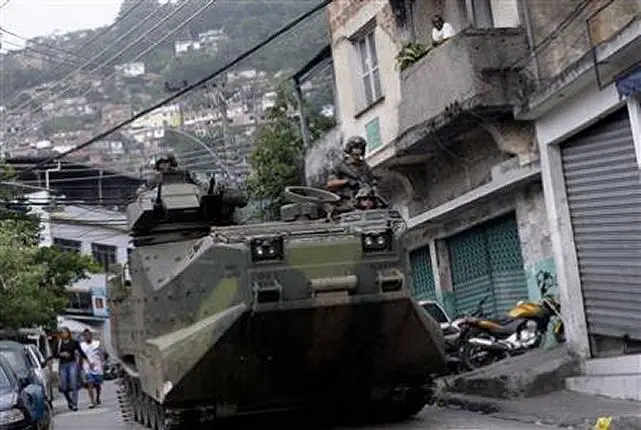Breaking news
Brazilian army with armoured vehicles and helicopters on the street to combat drug gangs 1411111.
| a | |||
Defense News - Brazil |
|||
| Monday, November 14, 2011, 08:56 AM | |||
| Brazilian army with armoured vehicles and helicopters on the street to combat drug gangs. | |||
Three
thousand troops backed by helicopters and armored vehicles occupied Rio
de Janeiro's largest slum without firing a shot on Sunday, the biggest
step in the Brazilian city's bid to improve security and end the reign
of drug gangs. |
|||
 Brazilian army on the street with armoured vehicles to combat drug gangs |
|||
|
The occupation of Rocinha, a notorious hillside "favela" that overlooks some of Rio's swankiest areas, is a crucial part of the city's preparations to host soccer's World Cup in 2014 and the Olympics two years later. Security forces have occupied nearly 20 slums in the past three years but none as symbolically or strategically important as Rocinha, a sprawl of shacks, stores and evangelical churches located at a traffic choke point between the main city and western areas where most Olympic events will be held. With large army helicopters thudding overhead, soldiers and police began climbing the slum's winding roads just after 4 a.m. and declared the operation a success within two hours after encountering no resistance. The invasion of Rocinha and the nearby Vidigal slum was as much a media event as a military operation, as dozens of reporters followed police up through deserted, garbage-strewn streets. The authorities had announced their plans days in advance, giving gang members plenty of notice to flee. According to TV news channel GloboNews, only one person was detained during the operation and there were no reports of casualties. Troops later hoisted the Brazilian flag over the community to symbolize its "return" to the state. After years of living in fear of both gang members and the often-violent tactics of police, residents were wary of embracing the new reality. "Let's hope for the best, but there's a lot more that needs to be done," said Sergio Pimentel, a funeral director sitting outside his business watching the operation unfold. He pointed to an alley that he said poured raw sewage on to the street whenever it rained. "We need basic sanitation, health, education. They have to come in with everything, not just the police." |
|||



















